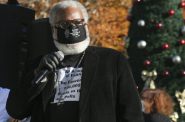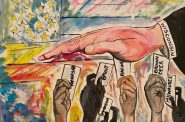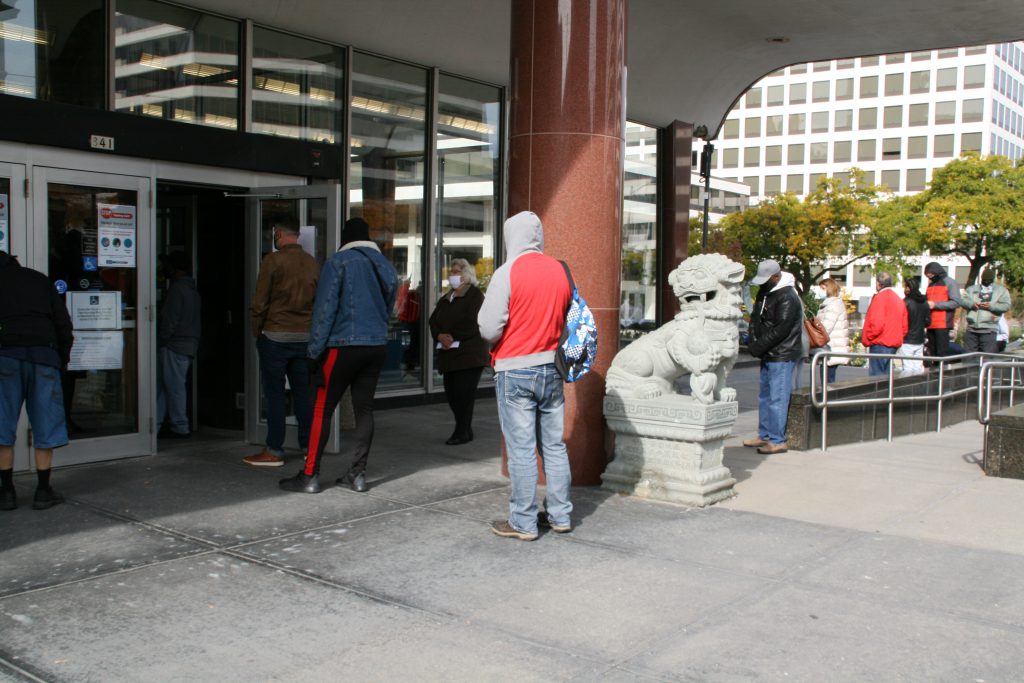Some States Restoring Felon Voting Rights
Restoring voting rights boosts civic engagement, may lower recidivism. Final story of series.
The national conversation around felony voting rights has lingered for decades and is considered to be a hot potato for politicians.
In Wisconsin, the state banned 68,000 felons from voting. This includes people in prison and on community supervision. In the United States, 5.2 million people can’t vote because of their criminal status. But the drive for change in Wisconsin remains at a standstill as advocates sought to allow people on community supervision the right to vote.
“Since we published this report (about felony voter disenfranchisement) four years ago, a million more people have gotten a vote. But that still begs the question: Why do we have five million people in this country that can’t vote because of the criminal justice system?” said Amy Fettig, executive director of the Sentencing Project.
How D.C. restored voting rights for felons
Robert White, a sponsor of the prison voting bill and a Washington, D.C., City Council member, said passing the bill meant that issues around prison conditions, lack of re-entry services or the overuse of solitary confinement would have a better chance of being addressed.
He included the reinstatement of felon voting rights as part of the emergency police reform bill. The bill, which passed this year, repealed language in a 1955 law that prohibited people from voting following a felony conviction.
Critics of White’s bill feared political consequences. Republicans feared they would lose votes, and Democrats feared perceptions of being soft on crime, he said.
“And that leads us to this political stalemate where it comes down to some kind of vote counting exercise, instead of a discussion about a fundamental right in a democracy,” he said.
What happens when felons return to the voting booth?
Vote counting aside, the impact of restoring those rights does not seem to move the needle much either way when it comes to getting people to the voting booth.
In Vermont, where incarcerated felons can legally vote, studies show a relatively low voter turnout, according to research on Vermont’s incarcerated voter turnout by students at MIT.
“People have made moral claims both for and against re-enfranchising people with felony convictions, and our findings suggest that such normative debates are more relevant than the possibility of imprisoned voters swinging election outcomes,” authors Ariel White and Avery Nguyen stated.
But White also believed the law change would help create a voting block.
“If folks who are incarcerated cannot hold elected officials accountable, we won’t see change on the back end.”
Robert White
While voter turnout may not be substantial, it would have influenced some races, specifically in seven U.S. Senate races from 1970 to 1998 and the 2000 Bush-Gore presidential election, Uggen said.
Restoring felony voting rights boosts civic engagement, may lower recidivism
Restoring felony voting rights to people leaving prison could help them transition into a more stable life after their release.
Many formerly incarcerated people report feeling isolated after their release from prison, and revoking a person’s right to vote compounds that feeling.
“In one study, among individuals who had been arrested previously, 27% of non-voters were rearrested, compared with 12% of voters. Although the limitations of the data available preclude proof of direct causation, it is clear that ‘voting appears to be part of a package of prosocial behavior that is linked to desistance from crime,’” Uggen wrote.
Racine man talks about being a felon, voting and civic life
This trend holds true for Racine resident Maurice Horton, who had his past felony drug conviction pardoned by former Governor Jim Doyle in 2007.
Now, he serves on the Racine Common Council. Since his release from prison in 1995, he served as a volunteer for the Racine Police Department’s Gang Diversion Task Force, worked in a gang diversion program at the Racine Unified School District and now works to recruit at-risk youth for pre-apprenticeship training.
Having the right to vote and holding political office made him a member of the community he now serves. And now he can’t remember an election he hasn’t voted in. But not having that right made him feel limited in what he could do as a citizen.
“You know, it felt like I was still being penalized for something that I paid their price for,” Horton said. ”And I think it has a ripple effect on everything that you do.”
Some call for federal law, Wisconsin slow to take up the issue
Nationally, this patchwork of laws impacted 6.1 million people in 2016. Even with some states implementing fewer restrictions, the laws still prevent 5.2 million people from voting. In contrast, the number of people disenfranchised hovered between 1.2 million and 1.8 million between 1960 and 1976, according to a report by the Sentencing Project.
As states have implemented these changes, the data shows that the recidivism rates have dropped.
White called for a federal law around felon voting rights to address the confusion.
“I think that there has to be a concerted national effort to equalize everything,” he said. “I mean, if you look at this smoking age, it was just raised to 21. So I don’t see why there is any reason why there can’t be a national effort to simplify this matter of voting so that there is no confusion.
“There’s no confusion in Vermont, no confusion in Maine, no confusion in D.C. now, the basic requirement is citizenship and are you old enough?” White added.
In Wisconsin, Ex-incarcerated People Organizing (EXPO) and the American Civil Liberties Union (ACLU) asked state legislators to consider restoring rights to felons who had been released from prison. Their bill — LRB 1522 and LRB 3567 — never made it out of committee.
Still, advocates for restoring felony voting rights say they plan to re-introduce the bill in January.
While lobbying for the bill that would have restored voting rights for people once they served their prison sentence, Jerome Dillard, executive director for EXPO, said the issue of whether voting was a right or a privilege was discussed.
“I could not believe some of the things that some of the Republicans were saying, that voting is a privilege. ‘It is not a right,’ they said. And I take them to the 14th Amendment (in the Constitution) and say, ‘What does this say?’” Dillard said.
Unlocking the vote: How other states have eased felony voting laws was originally published by Racine County Eye.
Denied the Vote
-
A History of Barring Felons From Voting
 Dec 28th, 2020 by Denise Lockwood
Dec 28th, 2020 by Denise Lockwood
-
Why Most Felons in State Can’t Vote
 Dec 27th, 2020 by Denise Lockwood
Dec 27th, 2020 by Denise Lockwood





















